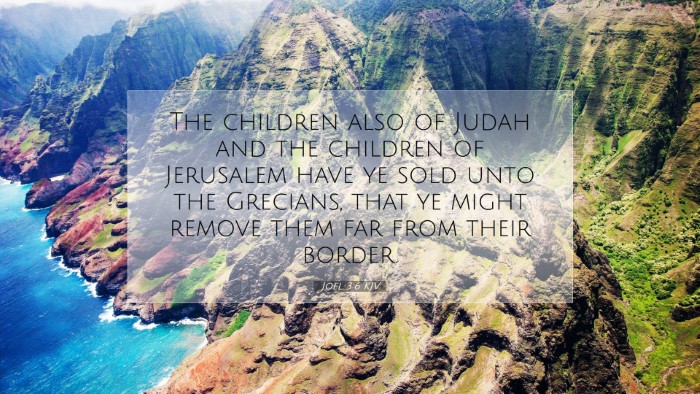Old Testament
Genesis Exodus Leviticus Numbers Deuteronomy Joshua Judges Ruth 1 Samuel 2 Samuel 1 Kings 2 Kings 1 Chronicles 2 Chronicles Ezra Nehemiah Esther Job Psalms Proverbs Ecclesiastes Song of Solomon Isaiah Jeremiah Lamentations Ezekiel Daniel Hosea Joel Amos Obadiah Jonah Micah Nahum Habakkuk Zephaniah Haggai Zechariah MalachiJoel 3:6
Joel 3:6 KJV
The children also of Judah and the children of Jerusalem have ye sold unto the Grecians, that ye might remove them far from their border.
Joel 3:6 Bible Commentary
Commentary on Joel 3:6
The verse Joel 3:6 states:
"The children also of Judah and the children of Jerusalem have ye sold unto the Grecians, that ye might remove them far from their border."
Introduction
This verse forms part of the prophetic message delivered by the prophet Joel, who addresses the troubling actions of certain nations against Israel, particularly the selling of Judah and Jerusalem's children into slavery. This passage offers critical insights into sin, justice, and the ultimate restoration promised by God.
Contextual Understanding
In the larger context of Joel, this chapter speaks of the Day of the Lord—a time of reckoning for nations that have acted unjustly against His people. The prophet lamentingly points out the grievous actions taken by the nations, showing both the urgency of repentance and the subsequent divine judgment.
Historical Background
Historically, the exploitation of conquered peoples was common, particularly regarding the children of nations. The Grecians in this verse likely refer to the broader Hellenistic world, which had engaged in such transactions. Joel’s audience would have understood the impacts of their sins and the severity of foreign involvement through servitude.
Theological Insights
Several theological themes emerge from this verse:
- Injustice Against God’s People: The sale of children signifies deep moral failure. It shows how dire the situation had become in Judah and Jerusalem, where the vulnerable were exploited for gain.
- Divine Justice: Joel underscores that while nations may seem to act with impunity, God’s justice will ultimately prevail. The Lord sees the actions against His children and will not leave sin unpunished.
- The Cost of Disobedience: The actions of selling children reflect the broader theme of disobedience to God, which leads to severe consequences, including national calamity and loss of identity.
- Hope for Restoration: Though the verse speaks of scorn and oppression, it is set against the background of a restorative promise. God will eventually reclaim His people and restore their fortunes, as further promised in the latter part of this chapter.
Commentary Insights
Matthew Henry's Commentary
Matthew Henry notes that this passage illustrates the baseness of selling one’s own kin. He emphasizes that the wickedness of Judah's enemies did not merely involve physical bondage but spiritual degradation as well. The exile of the youth was not only a political act but also an affront against the covenant relationship between God and His people. Henry stresses the moral implications of such actions and provides encouragement that God’s judgment will ultimately bring about justice.
Albert Barnes' Notes
Albert Barnes elaborates on the motif of the children sold into slavery. He emphasizes the shame and disgrace that this act brought upon Judah and Jerusalem. Barnes points out that not only have the people been wronged, but the actions of selling children to the Grecians highlight a rejection of God’s protective covenant. He emphasizes that the Israelite identity is deeply marred by such acts and reminds readers of God’s promise to avenge the wrongs done to His people. Barnes connects this to the broader narrative of restoration found in Scripture.
Adam Clarke's Commentary
Adam Clarke approaches the verse by discussing the role of the Grecians as oppressors, illustrating how those who had once been the recipients of God’s covenant grace became complicit in idolatry and vice, leading to their downfall. Clarke also emphasizes the judgment awaiting the Grecians for their role in the oppression of God’s people. He offers a cautionary note that such actions not only have temporal implications but also affect one’s standing before God eternally.
Conclusion
Joel 3:6 encapsulates a poignant reflection on the themes of injustice, divine retribution, and hope for restoration. It serves as a reminder to contemporary readers, especially pastors, students, and theologians, to remain vigilant against injustice and to foster a community that upholds the dignity and worth of all individuals as creations in God’s image. The reflections from respected commentators reinforce the call to personal and corporate responsibility in addressing moral failures and seeking justice for those oppressed. In light of God’s sovereignty, believers are encouraged to trust in His promises and anticipate both His judgment against wrongdoing and His grace for restoration.


